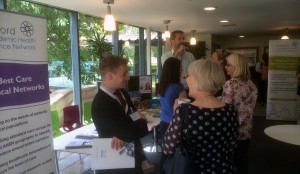 The Oxford Academic Health Science Network’s second annual meeting provided an opportunity to hear about some of the major achievements from partnership working across our region in 2014/15.
The Oxford Academic Health Science Network’s second annual meeting provided an opportunity to hear about some of the major achievements from partnership working across our region in 2014/15.
Discussions during the main session on 17 June picked out some of the highlights from our Annual Review – with the conversations continuing outside in our information zone where delegates could meet the leads of our programmes, themes and clinical networks.
Oxford AHSN Chief Executive Prof Gary Ford said the AHSN’s work was about improving patient outcomes, experience and safety by finding better ways to do things – and most of this was achieved through local partners.
He singled out our Anxiety and Depression Clinical Network for praise. A ten per cent improvement in recovery rates was down to the collection of comprehensive data, high quality research, links with existing professional networks and access to training.
“They are an exemplar to improve outcomes and reduce variation,” Prof Ford said.
He also highlighted the “space to health” work led by the Open University which has demonstrated the relevance of skills and expertise from space technology to support innovation in the NHS.
Read the presentations from the Oxford AHSN Partnership Council meeting here: Clinical Innovation Adoption, Maternity, Children
Tracey Marriott, Director of Clinical Innovation Adoption, outlined how the Oxford AHSN is bringing universities, industry and the NHS together to spread the adoption of innovation, yielding real benefits for patients.
The Partnership Council meeting had a particular focus on the early years of life.
Mr Lawrence Impey, Oxford AHSN Maternity Clinical Network Lead talked about their work to establish consistent drug use guidelines and effective transfers of sick and premature babies to the regional tertiary referral centre.
 He highlighted a happy outcome for a baby born at 25 weeks after its mother developed sepsis. Both are doing well because new guidelines were followed. However, he said effective data collection remains a challenge because hospitals have different systems.
He highlighted a happy outcome for a baby born at 25 weeks after its mother developed sepsis. Both are doing well because new guidelines were followed. However, he said effective data collection remains a challenge because hospitals have different systems.
Dr Craig McDonald set out some of the achievements of the Oxford AHSN Children’s Clinical Network particularly around reducing variation in care based on best evidence with a focus on bronchiolitis, gastroentoritis and antibiotic prescribing.
“Wherever they go, parents should get consistent advice,” he said. “We want to put fewer needles into kids, to stop doing stuff that is not necessary. There is a real appetite to start thinking more regionally about this.”

